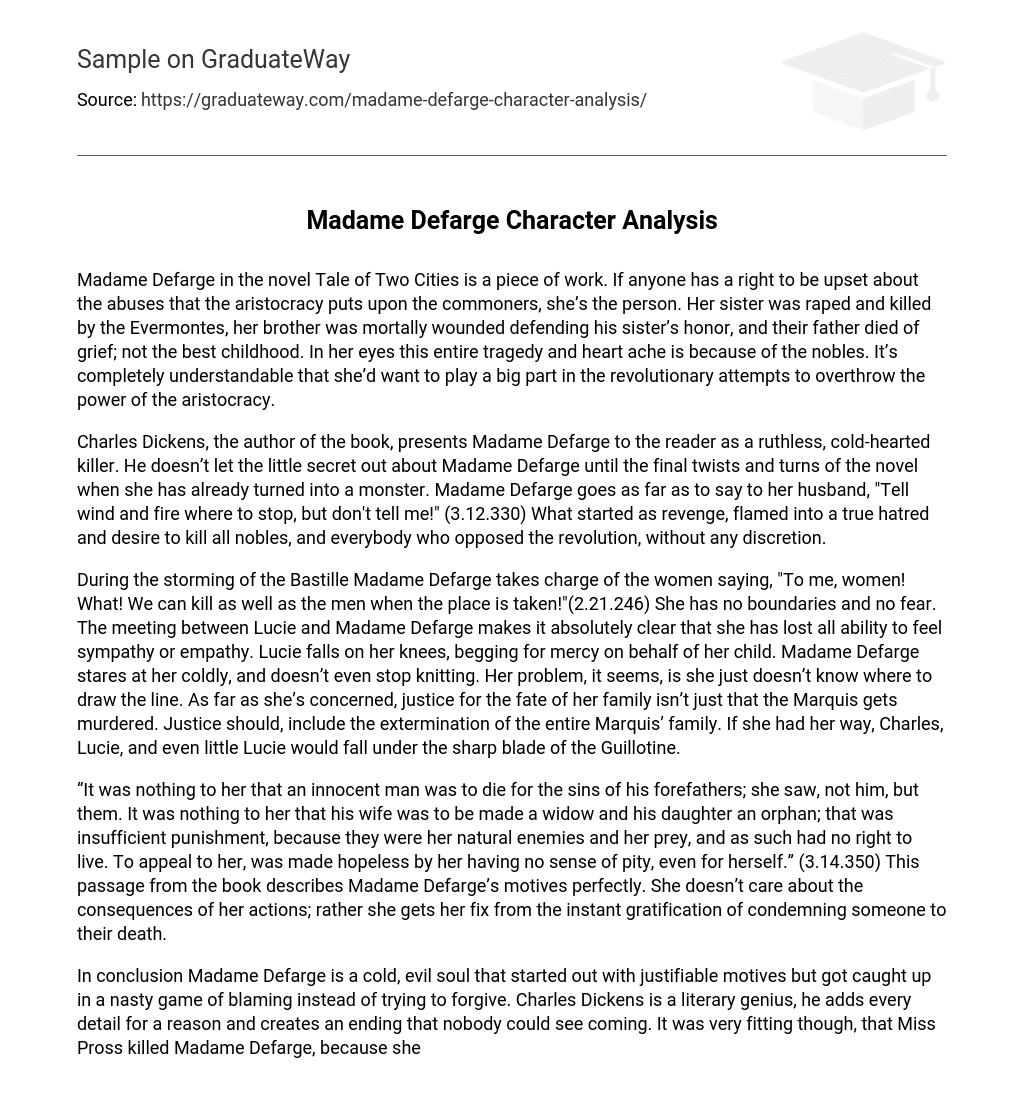Madame Defarge is a remarkable character in the novel Tale of Two Cities. She has every reason to be outraged by the mistreatment inflicted on the common people by the aristocracy. The Evermontes raped and murdered her sister, her brother was fatally injured while trying to protect her sister’s honor, and their father died of sorrow. These childhood experiences have shaped Madame Defarge’s belief that the nobles are responsible for this tragic series of events. Thus, her involvement in the revolutionary movement to overthrow the power of the aristocracy is justified.
Charles Dickens introduces Madame Defarge in his novel as a merciless and heartless murderer. The revelation of Madame Defarge’s true nature is not disclosed until the thrilling climax of the story, by which point she has transformed into a monstrous figure. Madame Defarge boldly declares to her husband, “Tell wind and fire where to stop, but don’t tell me!” (3.12.330). Initially driven by a desire for vengeance, her passion evolved into an intense hatred and insatiable urge to exterminate all aristocrats and anyone who opposed the revolution, without any discrimination.
During the storming of the Bastille, Madame Defarge takes charge of the women, urging them to join in the killings once the place is taken. Her lack of boundaries and fear have become evident. When Lucie and Madame Defarge meet, the latter’s complete absence of sympathy or empathy becomes apparent. Lucie pleads for mercy on behalf of her child while kneeling, but Madame Defarge coldly stares at her, not even pausing her knitting. The issue seems to be that Madame Defarge struggles to establish limits. For her, justice for her family’s fate means more than just murdering the Marquis. She believes that justice should involve wiping out the entire Marquis’ family, including Charles, Lucie, and even little Lucie. In her ideal scenario, they would all face the guillotine’s sharp blade.
Madame Defarge’s motives are accurately described in this passage from the book. She does not concern herself with the repercussions of an innocent man being executed for the sins of his ancestors; instead, she focuses on them as her targets and enemies. The punishment inflicted upon his wife and daughter is deemed insufficient, as they hold no right to live in her eyes. Appeals to her compassion are futile, as she lacks any semblance of pity, even towards herself. This passage highlights how Madame Defarge derives pleasure from the instant satisfaction of sentencing someone to their death.
In conclusion, Madame Defarge is portrayed as a cold and evil character who initially had understandable motives but eventually became consumed by a destructive game of blame rather than forgiveness. Charles Dickens, a literary genius, meticulously includes every detail in his work and surprises readers with an unexpected ending. It is particularly appropriate that Miss Pross ultimately kills Madame Defarge, as she has been Lucie’s protective figure throughout the entire narrative. Madame Defarge serves as an integral part of the story, driving its momentum and keeping it captivating. Her character evokes various emotions in readers, ranging from sadness to anger and everything in between.





